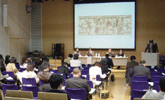国際シンポジウム:
"Ethnic Division of Polity and Society in Post-Civil War and Under-Conflict Nations: Cyprus, Lebanon, Former Yugoslavia, Iraq and Israel/Palestine"
趣旨
日本学術振興会・人文・社会科学振興プロジェクト研究事業の一つ「平和構築に向けた知の展開」プロジェクトは、東京外国語大学「中東イスラーム研究教育プロジェクト」と共催で、下記の要領で国際シンポジウム"Ethnic Division of Polity and Society in Post-Civil War and Under-Conflict Nations: Cyprus, Lebanon, Former Yugoslavia, Iraq and Israel/Palestine"を開催します。詳しくは英語版の趣旨文をご覧頂きたく存じますが、中東・バルカン地域で内戦や武力衝突を伴いつつ進行してきたエスニックなラインに沿った国家の分割、社会の分裂の問題を、多角的に検討することを目指しています。エスニックな分断は避けられない、仕方のないことなのか?現地から招聘する研究者や知識人とともに、このテーマについて議論を深めたいと考えます。多くの方々の御参加をお待ちしております。
日程・会場ほか
・日 時: 2007年1月28日(日)10:30-20:30(開場10:00-20:30)
・場 所: 東京グリーンパレス らんWの間( http://www.tokyogp.com/index.html )
・備 考: 入場無料(レセプション会費制)、参加自由(事前登録不要)、日英同時通訳つき、詳細は地域研究による「人間の安全保障学」の構築ホームページでもご覧いただけます。
プログラム
10:00- Doors Open
10:30-10:45 Hidemitsu Kuroki (Professor, ILCAA, Tokyo University of Foreign Studies): Welcome Remarks and Preamble
1. Session of Cyprus and Lebanon
Chair: Makoto Kobayashi (Professor, Yokohama City University)
10:45-11:15 Andreas Theophanous (Professor, Intercollege, Cyprus)
"Revisiting the Cyprus Question: The Challenge and the Promise"
11:15-11:30 Discussion
11:30-12:00 Lokman Slim (Director, Umam Documentation and Research, Lebanon)
"Lebanon: failure of a "common task"?"
12:00-12:15 Discussion
12:15-13:30 Lunch Break & Coffee Break
2. Session of Former Yugoslavia
Chair: Yuji Ishida (Professor, University of Tokyo)
13:30-14:00 Tetsuya Sahara (Associate Professor, Meiji University)
"Yugoslav wars of succession: chaotic nationalism or nationalization of chaos?"
14:00-14:30 Hidajet Repovac (Professor, Sarajevo University, Bosnia and Herzegovina)
"Ethnic Conflicts on the Balkans - Case of Bosnia and Herzegovina"
14:30-14:50 Discussion
14:50-15:05 Coffee Break
3. Session of Iraq and Israel/Palestine
Chair: Keiko Sakai (Professor, Tokyo University of Foreign Studies)
15:05-15:35 Ghanem Jawad (Al-Khoei Foundation, United Kingdom)
"The Structure of Iraqi Shias"
15:35-15:50 Discussion
15:50-16:20 Ahmad Sa'di (Professor, Ben-Gurion University of the Negev, Israel)
"Advocating "Transfer" : The Liberman Epiphenomenon"
16:20-16:35 Discussion
16:35-16:50 Coffee Break
4. Session of Comments and Discussion
Chair: Jun Furuya (Professor, Hokkaido University)
16:50-17:20 Comment1: Hala Fattah (Former Director, American Academic Research Institute in Iraq, Jordan)
17:20-17:40 Comment2: Taro Tsukimura (Professor, Kobe University)
17:40-18:00 Comment3: Hiroyuki Tosa (Professor, Kobe University)
18:00-18:30 Discussion
18:30-20:30 Reception
Preamble:
Ethnic partition of state is a formula commonly applied to settle ethnic/ sectarian conflicts and civil wars. Even though the state is downsized as a result and its former national economy is fragmented into less efficient sub-national pieces, partition is often chosen as a solution with regret and resignation, on the justification that there is no other way to resolve the violent confrontation.
The Middle East and the Balkans are warehouses of ethnic conflict and divided states. In 1974, after two decades of violent confrontation between the Greeks and the Turks in Cyprus, a border was created to divide the island between the south and the north. This separation still continues today, despite local movements for reunification. In 1975, the civil war in Lebanon erupted as a result of sectarian antagonism and the Palestine Question. At the beginning of the fifteen-year civil war, the Lebanese feared their nation would follow in the footsteps of Cyprus. The small country’s dissolution into even smaller cantons created the term "Lebanonization," which was applied to the situation in Yugoslavia after 1991. Here, ten years of conflict and bloodshed dissolved the multi-ethnic country into five republics. Most recently, the sixth state of Montenegro was peacefully separated from Serbia in June this year. Now Iraq is on the verge of devastating civil war and is said to be in the process of "Lebanonization": the Kurdish north, the Sunnite center, and the Shiite south. In Israel/Palestine, extensive concrete walls are ghettoing the Palestinians into cage-like areas. Avigdor Lieberman, the vice-prime minister of Israel, now openly insists that Israel follow the "Cyprus Model," suggesting the possibility of expelling the Arab-Israeli population beyond the walls from inside Israel.
Ethnic partition of state causes ethnic division of society, and vice versa. During the civil wars of the Middle East and Balkan countries, polarization of residential areas along ethnic lines, population exchange, forced displacement, and "ethnic cleansing" occurred.
Here we raise questions. How are the multi-ethnic system and pluralism of the pre-partition states evaluated among divided societies? How were memories of pre-civil war co-existence transformed through these ethnic conflicts? Was ethnic division inevitable? How did exterior powers, including the super powers, intervene in the conflicts and exert their influence in the formation of the post-civil war framework? Do we see the shadow of colonialism in this process?
At this symposium we will discuss the above points from the perspectives of the respective countries and will explore the potential "local wisdom" applicable to establishing democracy in multi-ethnic societies.
お問い合わせ: 「人間の安全保障学」事務局
e-mail: murakami@aa.tufs.ac.jp
主催:
・日本学術振興会人文・社会科学振興プロジェクト研究事業「平和構築に向けた知の展開」(代表:黒木英充)
・東京外国語大学中東イスラーム研究教育プロジェクト
後援:
・NIHUプログラムイスラーム地域研究(東京大学拠点)
・日本学術振興会・科学研究費・基盤研究(A)「現代アジア・アフリカ地域におけるトランスナショナルな政治社会運動の比較研究」(研究代表者:酒井啓子)



